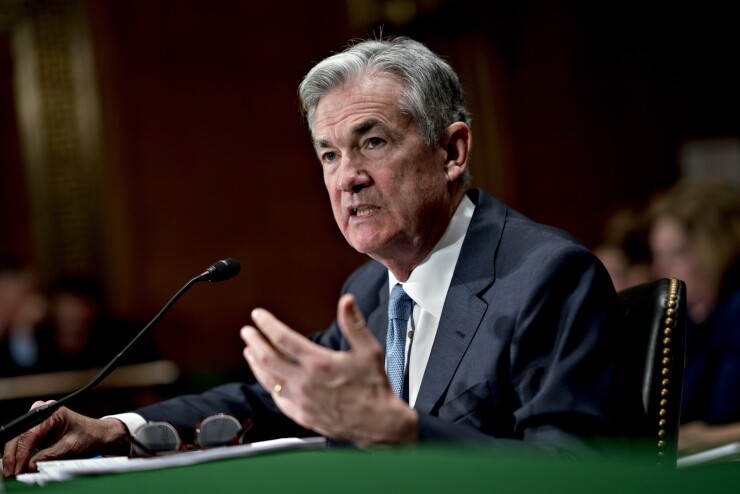WASHINGTON — The Federal Reserve is limiting use of its "qualitative objection" in this year’s stress tests, the agency announced Wednesday.
The Comprehensive Capital Analysis and Review exercise has historically included both quantitative and qualitative evaluations of a large bank's ability to withstand shocks to the financial system.
But this year, just five out of 18 firms — U.S. subsidiaries of Barclays, Credit Suisse, Deutsche Bank, TD Bank and UBS — will risk potentially failing the qualitative portion of the test. Banks that have already participated in four previous stress tests and that passed the qualitative evaluation in their fourth year will be exempt.

"The Committee has stated that we do not expect it will be appropriate to reduce the target range for the federal funds rate until we have gained greater confidence that inflation is moving sustainably toward 2%."
The qualitative portion of the test has, in the past, given regulators greater discretion to fail certain banks due to risk management or operational failures.
The five firms that are still subject to the qualitative objection this year will “generally” reach their fourth stress test in 2020, according to the Fed. And starting in 2021, the central bank will no longer issue a qualitative objection for any bank, unless the firm received one the previous year.
“While the qualitative objection will no longer apply to certain firms, all firms will continue to be subject to a rigorous evaluation of their capital planning processes as part of CCAR,” the Fed said in a statement. “Firms with weak practices may be subject to a deficient supervisory rating, and potentially an enforcement action, for failing to meet supervisory expectations.”
The change comes just one month after the Fed announced it would
The Fed said the banks that do not have to undertake a 2019 stress testing cycle would still be subject to the results of the 2018 stress test, meaning that capital disbursements would still be restricted if supervisors observed outflows out of line with the firms' existing capital plans.
The other 13 banks that will be subject to stress test scenarios absent the qualitative objection are Bank of America, Bank of New York Mellon, Capital One, Citigroup, Goldman Sachs, HSBC, JPMorgan Chase, Morgan Stanley, Northern Trust, PNC, State Street, U.S. Bancorp and Wells Fargo. Eleven of the banks with large trading operations will be subject to a global market shock as part of their stress tests, while 13 firms will also be required to test a counterparty default scenario.





